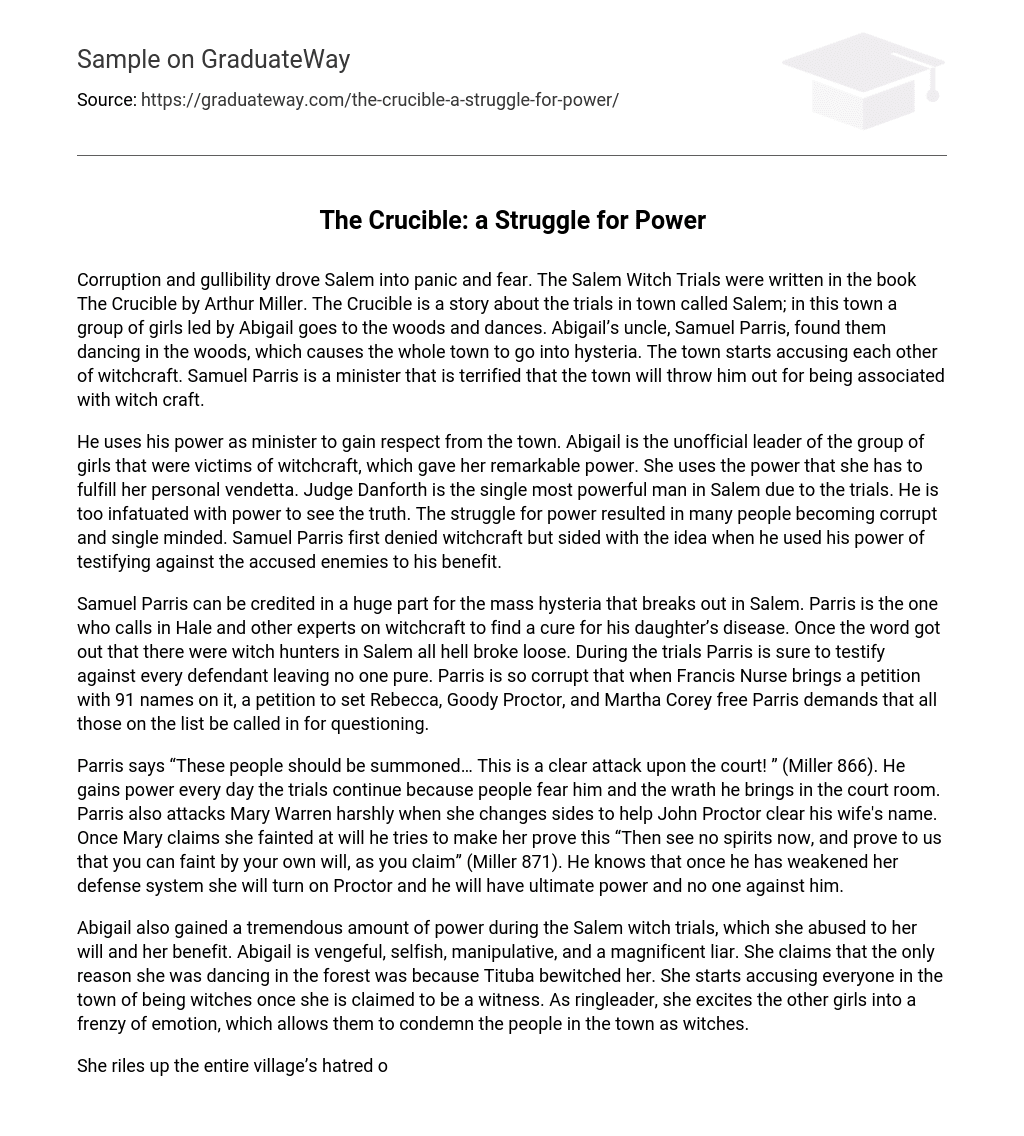The Salem Witch Trials, which were depicted in Arthur Miller’s book “The Crucible,” were driven by corruption and gullibility, resulting in panic and fear in Salem. The story revolves around a group of girls led by Abigail, who engage in dancing in the woods. Their activities were discovered by Abigail’s uncle, Samuel Parris, who is a minister filled with terror at the prospect of being associated with witchcraft. This discovery causes the entire town to descend into hysteria and start accusing one another of practicing witchcraft.
The minister wields his power to earn the town’s respect while Abigail, as the unofficial leader of the group of girls affected by witchcraft, enjoys significant power which she exploits for her personal revenge. Meanwhile, Judge Danforth, the most influential figure in Salem because of the trials, is too obsessed with power to perceive the truth. As a result of the power struggle, many individuals become corrupt and narrow-minded. Initially, Samuel Parris refutes witchcraft but aligns himself with the notion when he realizes the advantageous impact on his power to testify against his supposed adversaries.
Samuel Parris can be credited for the mass hysteria that erupts in Salem as he calls in witchcraft experts to address his daughter’s illness. The presence of these witch hunters in Salem triggers chaos as trials ensue. Parris gives damning testimonies against each defendant, showing his corruption. When Francis Nurse presents a petition with 91 signatures to free Rebecca, Goody Proctor, and Martha Corey, Parris demands that everyone on the list be interrogated.
According to Miller (866), Parris declares that the individuals responsible for the alleged attack on the court should be called forth. As the trials persist, he continues to amass power, mainly fueled by the fear he instills in people within the courtroom. Furthermore, Parris directs strong criticism towards Mary Warren when she switches sides to support John Proctor in clearing his wife’s reputation. At the point when Mary contends that she can faint at will, Parris demands proof of her claim by stating, “Then see no spirits now, and prove to us that you can faint by your own will, as you claim” (Miller 871). Recognizing that Mary’s defense will crumble once he weakens it, Parris anticipates that she will eventually turn on Proctor, allowing him to wield ultimate power without any opposition.
Abigail gained an immense amount of power during the Salem witch trials that she exploited for her own advantage. She displayed traits of vengefulness, selfishness, manipulativeness, and a great talent for deception. Her justification for dancing in the forest was solely blaming Tituba for bewitching her. Moreover, once she was identified as a witness, she began accusing everyone in the town of practicing witchcraft. Taking on the role of a ringleader, she incited the other girls into a state of heightened emotions, thus enabling them to accuse others from the town as witches.
She stirs up the entire village’s animosity towards witches and uses her influence to condemn Elizabeth Proctor, the wife of John Proctor, whom she loves. Cheever informs Proctor, “She testifies that it was your wife’s familiar spirit that pushed it in” (Miller 860). Abigail seeks revenge on Elizabeth for expelling her from the house and separating her from her beloved. Her intention is to eliminate Elizabeth so she can freely pursue a relationship with Proctor. Abigail pushes her dominance to the limit, ultimately fleeing town with all of her uncle’s money.
Danforth’s obsession with gaining power during the Salem witch trials led to his becoming single-minded and oblivious as the judge. He ruled over the courtroom with a dictatorial approach, displaying an icy and firm belief in the innocence of Abigail Williams and the other girls. Even a mere mention of a name from these young women would cause Danforth to assume it belonged to a witch. His gullibility is surpassed only by his self-righteousness, as he accuses anyone from the town who dares to defend the accused of attempting to overthrow the court.
Danforth states, “But you must understand sir that a person is either with this court or he must be counted against it. There will be no road between” (Miller 867). Judge Danforth holds the belief that his perception is impeccable. He feels offended when his decision-making ability is doubted and asserts authority over all individuals in the courtroom. Despite the undeniable falsehood of the witchcraft accusations, Danforth stubbornly turns away from the truth and executes innocent individuals to protect his own reputation.
The witch trials empowered Danforth, Abigail, and Parris, but they chose to misuse this power for their personal interests rather than for the greater good. Similarly, many individuals in the real world attain significant power rapidly and succumb to selfishness. A prime example of this is the police force, which can become corrupted in its duty to uphold law and order, resulting in detrimental consequences for both the nation and its citizens. Sadly, combatting corruption and power abuse offers no straightforward solution; only someone with even greater power can halt such misconduct.





